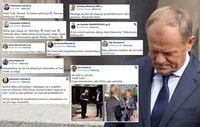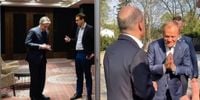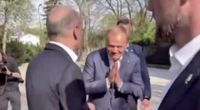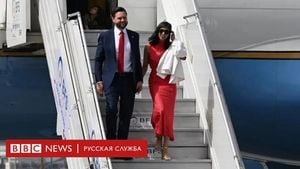In a politically charged atmosphere, outgoing German Chancellor Olaf Scholz visited Warsaw on April 16, 2025, for a final meeting with Polish Prime Minister Donald Tusk. This visit, marked by a significant gesture from Tusk, has ignited a wave of criticism and commentary across social media.
Scholz's trip to Poland signifies the end of his tenure, as he prepares to hand over the reins to Friedrich Merz, who is set to begin his term with visits to both Warsaw and Paris. Tusk expressed his sentiments about the meeting on social media, stating, "Chancellor Olaf Scholz ends his mission with a meeting in Warsaw, and Chancellor Friedrich Merz will begin his term with visits to Warsaw and Paris. Poland is today a key partner for all significant forces in Europe, whether someone likes it or not." This statement underlines Poland's strategic importance in European politics.
However, the meeting took a controversial turn when a video surfaced showing Tusk bowing to Scholz, a moment that many commentators have described as humiliating. Marcin Dobski, a prominent commentator, remarked that the video was "humiliating for Prime Minister Tusk," highlighting the perceived submissiveness of Tusk's gesture towards the German leader.
The video quickly became a focal point for criticism, with various users on the platform X (formerly Twitter) mocking Tusk's actions. Comments ranged from calling it an "inverted Prussian tribute" to expressing disdain over the optics of Tusk's bow. Przemysław Czarnek, a member of the ruling Law and Justice party (PiS), stated, "Hołd Tuski. Dramat. To trzeba zakończyć. Pierwsza okazja już 18 maja," which translates to "Tusk's tribute. A drama. This needs to end. The first opportunity is on May 18." This remark suggests a call to action against what Czarnek perceives as Tusk's weakness.
Jan Kanthak, also from PiS, echoed this sentiment, stating that Tusk's actions were reminiscent of a "servile tribute" and that such gestures reflect a deeper, ingrained attitude in Tusk. Radosław Fogiel, another PiS MP, emphasized that the Polish Prime Minister should engage with other leaders as equals, further criticizing Tusk's diplomatic approach.
Karol Nawrocki, a civic candidate for the presidency supported by PiS, pointed out that the meeting failed to address critical issues such as reparations, the migration crisis, and foot-and-mouth disease. He characterized Tusk's willingness to meet the demands of the German state as an "inverted Prussian tribute," suggesting a historical echo of past subservience.
The context of Tusk's bow is further complicated by the ongoing discussions about reparations for World War II. Despite promises made by Scholz to address this issue, no substantial progress has been made. Instead of a monument honoring Polish victims of the war, only a boulder named "Stone of Remembrance for Poland" has been erected in Berlin, leaving many feeling that the German government has not fulfilled its obligations.
Dr. Andrzej Skiba, a political scientist, noted that Germany's unilateral border controls and the transfer of migrants of unknown origin into Poland pose additional challenges. He warned that pressure would increase on Poland to accept migrants from Germany, further complicating the relationship between the two countries.
Despite the criticisms, Tusk's administration has continued to advocate for strong ties with Germany, which remains a crucial economic partner for Poland. The two nations have seen their economic cooperation grow over the years, yet concerns linger about the balance of power in these dealings. Konrad Szymański, a member of the Confederation party, highlighted that German NGOs could potentially block or delay significant investments in Poland, raising alarms about the future of Polish autonomy in economic matters.
As Tusk prepares for the upcoming presidential elections, the fallout from this meeting with Scholz may play a pivotal role in shaping public perception. Many Poles are questioning whether Tusk's diplomatic style is effective or if it undermines Poland's standing on the international stage.
Social media has been flooded with reactions, with users sharing memes and critical comments about Tusk's bow. One user remarked, "500 lat później... Hołd Tuski," meaning "500 years later... Tusk's tribute," drawing a historical parallel that resonates with many who view the gesture as a sign of submission.
As the political landscape shifts with Merz's impending leadership, the relationship between Poland and Germany will undoubtedly be scrutinized. The upcoming elections and the potential for new policies could redefine how these nations interact moving forward.
In summary, the meeting between Tusk and Scholz has sparked significant debate about Poland's position in Europe and the nature of its relationships with powerful neighbors. The implications of Tusk's gestures and the ongoing discussions about reparations and migration will continue to influence Poland's political discourse.








